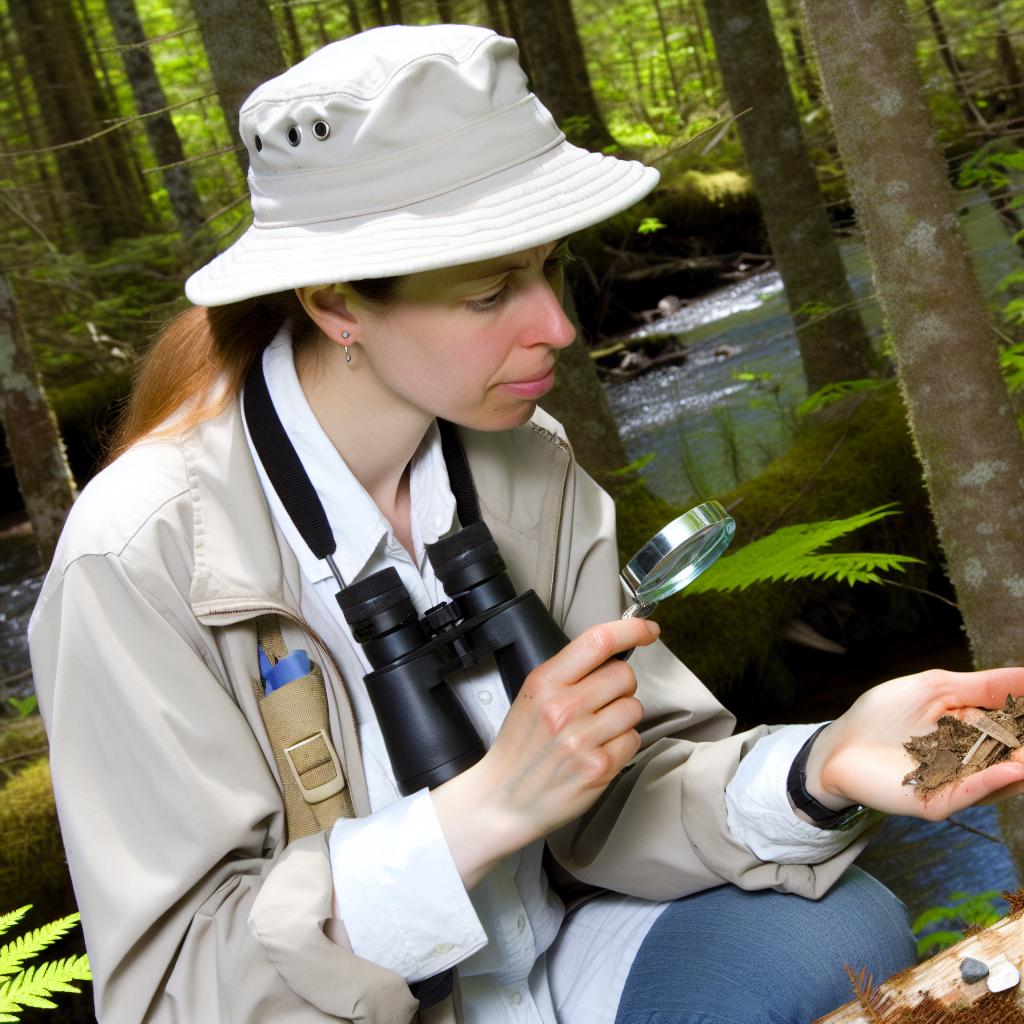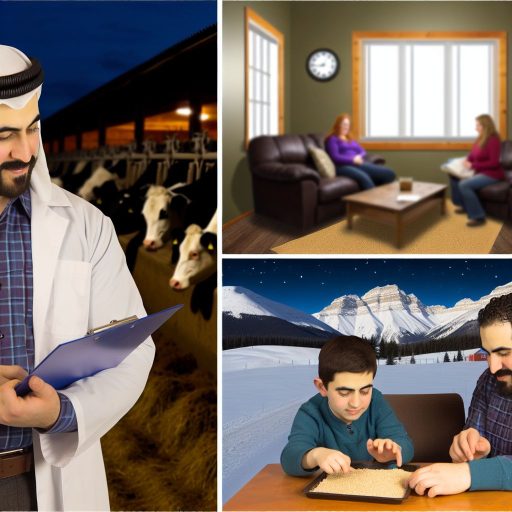Overview of Soil Science as a Discipline in Canada
Importance of Soil Science
Soil science plays a critical role in agriculture and environmental health.
It examines the formation, classification, and mapping of soils.
Additionally, it studies soil’s chemical, physical, and biological properties.
The discipline supports sustainable land use practices.
Moreover, it informs climate change mitigation strategies.
Educational Institutions Offering Soil Science Programs
Canada hosts several universities with strong soil science programs.
The University of Alberta provides a comprehensive Bachelor’s degree in Soil Science.
Similarly, the University of Guelph offers specialized courses in soil health and management.
Furthermore, the University of Saskatchewan emphasizes research in soil and water sustainability.
Many of these institutions promote hands-on learning experiences.
Degree Options Available
Students can pursue undergraduate and graduate degrees in soil science.
Bachelor’s programs focus on foundational knowledge and practical skills.
Graduate degrees offer advanced research opportunities and specializations.
For instance, soil ecology and soil chemistry are popular areas of study.
Students may also engage in interdisciplinary programs combining agriculture and environmental science.
Certification in Soil Science
Certifications enhance career prospects in soil science-related fields.
The Canadian Society of Soil Science offers professional certification for graduates.
This certification ensures that professionals meet industry standards.
Moreover, continuous professional development is essential for maintaining certification.
Workshops and courses are often provided to keep skills current.
Career Opportunities in Soil Science
Graduates can pursue diverse career paths upon completing their degrees.
Common roles include soil conservationist, agronomist, and environmental consultant.
In addition, government agencies and non-profit organizations often hire soil scientists.
These professionals contribute to policy-making and land management strategies.
Furthermore, opportunities exist within the agriculture and forestry sectors.
Unlock Your Career Potential
Visualize a clear path to success with our tailored Career Consulting service. Personalized insights in just 1-3 days.
Get StartedTypes of Degrees Available in Soil Science
Bachelor’s Degrees
Bachelor’s degrees in soil science are typically four-year programs.
These programs cover fundamental principles of soil science.
Students study topics such as soil chemistry and ecology.
Practical experience is often included through laboratory work.
Graduates may pursue careers in agriculture or environmental science.
Master’s Degrees
A master’s degree in soil science typically takes two years to complete.
These programs often focus on advanced research and specialized topics.
Students may engage in thesis work to demonstrate their expertise.
Internships may be part of the curriculum, enhancing real-world experience.
Graduates can work in research, policy-making, or consulting roles.
Doctoral Degrees
Doctoral programs in soil science usually require an additional four years of study.
Students focus on conducting original research in a specialized area.
Their work contributes significantly to the field of soil science.
Graduates often pursue academic or high-level research positions.
This degree may lead to roles in universities or government agencies.
Key Canadian Universities Offering Soil Science Programs
University of Alberta
The University of Alberta is a leader in soil science education.
It offers a comprehensive Soil Science program within the Faculty of Agricultural, Life, and Environmental Sciences.
Students can pursue a Bachelor of Science in Environmental and Conservation Sciences.
Advanced degrees, such as Master’s and PhD programs, focus on soil research and management.
The faculty conducts innovative research on soil health and sustainability.
University of Saskatchewan
The University of Saskatchewan boasts a strong agricultural focus in its programming.
Its Soil Science program is housed under the College of Agriculture and Bioresources.
Students engage in hands-on learning in state-of-the-art facilities.
Specializations include soil fertility, land reclamation, and soil conservation.
Research opportunities are available for graduate students.
University of Guelph
The University of Guelph is renowned for its agricultural programs.
It offers a Bachelor of Science in Agriculture with a concentration in Soil Science.
This program emphasizes practical skills and research methodologies.
Students also benefit from the university’s extensive research facilities.
The faculty works on projects addressing soil health in various ecosystems.
McGill University
McGill University’s Faculty of Agricultural and Environmental Sciences includes a focus on soil science.
Programs are designed to intersect with environmental sustainability and resource management.
Students can explore soil dynamics through both theory and fieldwork.
Their research often addresses climate change and its impacts on soil.
Engagement in local agricultural initiatives is encouraged.
University of British Columbia
The University of British Columbia provides a diverse approach to soil science education.
Students can pursue studies within the Faculty of Land and Food Systems.
Their programs integrate soil health science with food systems research.
Field research opportunities allow students to apply their knowledge practically.
Collaboration with local industries enhances the learning experience.
You Might Also Like: How Livestock Nutritionists Improve Animal Health
Importance of Soil Science Certifications
Enhancing Professional Credibility
Soil science certifications enhance professional credibility in the field.
They signal expertise to employers and clients alike.
Having a certification can distinguish professionals from their peers.
Consequently, it often leads to better job opportunities.
Contributing to Career Advancement
These certifications support career advancement for soil scientists.
They can lead to promotions and higher salary offers.
Moreover, continuous education keeps professionals updated with industry trends.
Meeting Regulatory Requirements
Some positions in soil science require specific certifications to comply with regulations.
This is especially important in government and consultancy roles.
Having the right certifications ensures adherence to environmental standards.
Expanding Knowledge and Skills
Soil science certifications offer opportunities for skill enhancement.
They encompass various topics, including soil conservation and management.
Furthermore, they enable professionals to explore new research and technologies.
Building a Professional Network
Obtaining certifications helps build a strong professional network.
Networking is vital for career growth in any industry.
Candidates often gain access to valuable connections through certification programs.
Promoting Lifelong Learning
Certifications encourage a culture of lifelong learning.
This is essential in a rapidly evolving field such as soil science.
Continuous education ensures professionals remain relevant in their expertise.
Gain More Insights: Starting a Career in Seed Technology in Canada
Common Certifications Available for Soil Science Professionals in Canada
Introduction to Certifications
Certifications enhance the credibility of soil science professionals.
They indicate specialized knowledge and skills in the field.
Many organizations offer various certification programs in Canada.
Certified Crop Advisor (CCA)
The Certified Crop Advisor program focuses on crop management skills.
Professionals must pass an exam covering topics like soil fertility.
This certification is awarded by the American Society of Agronomy.
It is recognized across Canada, making it highly valuable.
Soil Science Society of America Certification
The Soil Science Society of America offers certification programs.
These programs include Soil Scientist and Certified Professional Soil Scientist.
Applicants must meet educational and work experience requirements.
Continuing education is necessary to maintain this certification.
Environmental Professional (EP) Certification
The Environmental Professional certification highlights a commitment to environmental best practices.
Eco Canada administers this certification in Canada.
Professionals must demonstrate expertise in various environmental sectors.
This includes soil science, making it relevant for soil professionals.
Agroecology Certificate
This certificate concentrates on sustainable agricultural practices.
Institutions like the University of Guelph offer this program.
It covers topics such as soil conservation and agroecological systems.
Graduates can apply this knowledge in both urban and rural settings.
Additional Professional Development Opportunities
Many universities and colleges provide short courses and workshops.
These opportunities focus on specialized areas in soil science.
Workshops often cover topics like soil mapping and nutrient management.
These programs help professionals stay current with emerging trends.
Benefits of Certifications
Obtaining certifications significantly benefits soil science professionals.
It enhances job prospects and demonstrates a commitment to the field.
Continuous education is essential to remain relevant in this dynamic industry.
Explore Further: Understanding Seed Germination and Viability Testing

Career Opportunities for Graduates with Soil Science Degrees and Certifications
Introduction to Career Prospects
Graduates with Soil Science degrees find ample career opportunities.
Employers value their expertise in soil management and sustainability.
This field supports various sectors, including agriculture and environmental conservation.
Employment Sectors
Soil Science graduates can work in diverse sectors.
- Agriculture and farming
- Environmental consulting firms
- Government agencies
- Research institutions
- Non-profit organizations
Each sector offers unique challenges and rewards.
Job Roles and Responsibilities
There are many roles available for Soil Science graduates.
They may work as soil scientists, agronomists, or environmental scientists.
Soil conservationists also play a vital role in sustainable practices.
Additionally, graduates may engage in research or policy development.
Skills and Competencies
Successful graduates possess various skills that enhance employability.
These include analytical thinking and problem-solving abilities.
Communication skills are essential for effective teamwork and outreach.
Proficiency in soil testing and interpretation is also critical.
Employment Trends
The demand for soil scientists is growing due to climate change awareness.
More organizations prioritize sustainable land management practices.
Graduates have the opportunity to lead initiatives in soil health improvement.
Certification and Professional Development
A professional certification can enhance job prospects.
Organizations like the Canadian Society of Soil Science offer certifications.
These certifications demonstrate expertise and commitment to the field.
Continuous professional development keeps skills current and relevant.
You Might Also Like: How Arborists Diagnose and Treat Tree Diseases
The Impact of Soil Health on Agriculture and Environmental Sustainability
Understanding Soil Health
Soil health is crucial for sustainable agriculture.
It refers to the condition of soil based on its physical, chemical, and biological properties.
Healthy soil enhances plant growth and crop yield.
Additionally, it plays a vital role in ecosystem functioning.
Benefits of Healthy Soil for Agriculture
Healthy soil improves nutrient availability.
This leads to better crop nutrition and productivity.
Moreover, soil health increases moisture retention.
Consequently, crops require less irrigation.
Overall, healthy soil contributes to economic savings for farmers.
Soil Health and Environmental Sustainability
Healthy soil systems mitigate climate change effects.
They sequester carbon, reducing greenhouse gases in the atmosphere.
Furthermore, they enhance biodiversity by supporting various organisms.
This includes beneficial insects, fungi, and microorganisms.
Thus, soil health directly influences surrounding ecosystems.
Challenges in Maintaining Soil Health
Despite its importance, soil health faces numerous threats.
These include soil erosion, pollution, and unsustainable farming practices.
Pesticides and fertilizers can degrade soil quality.
Therefore, sustainable practices are vital for soil preservation.
Promoting Soil Health in Agricultural Practices
Farmers can adopt various practices to enhance soil health.
- Crop rotation helps maintain nutrient balance.
- Cover cropping protects soil from erosion.
- No-till farming minimizes soil disturbance.
- Organic amendments improve soil structure and fertility.
Implementing these practices fosters resilience in agricultural systems.
The Role of Education and Certification
Soil science degrees and certifications promote awareness.
They equip individuals with necessary skills to manage soil health.
Educational programs also address current soil challenges.
Thus, trained professionals play a significant role in sustainable agriculture.
Current Trends and Future Directions in Soil Science Education and Research
Emerging Academic Programs
Soil science degrees are evolving across Canadian universities.
Newly developed programs focus on sustainability and climate resilience.
For instance, the University of Alberta introduced a unique program this year.
This initiative emphasizes the importance of interdisciplinary approaches.
Students now collaborate with other fields like environmental science.
Innovative Research Areas
Research in soil science is increasingly prioritizing climate change impact.
Projects focus on soil health, carbon sequestration, and nutrient management.
For example, McGill University has launched studies on urban soil health.
These studies aim to address pressing issues in metropolitan agriculture.
Moreover, new technologies like remote sensing are revolutionizing research.
Industry Collaborations
Collaboration between universities and industries is becoming more common.
Agri-tech firms often partner with academic institutions for joint projects.
Such partnerships enhance real-world applications of soil science research.
Certain companies focus on developing soil health assessment tools.
These tools help farmers make informed decisions about land management.
Global Perspective and Networking
Canadian soil scientists are increasingly engaging on a global scale.
Conferences such as the International Union of Soil Sciences enhance networking.
These events facilitate knowledge exchange across countries and disciplines.
Furthermore, they foster collaborations that cross international boundaries.
This global perspective enriches the educational experiences for students.
Future Workforce Development
As the demand for soil science experts grows, education adapts accordingly.
Universities are proactively addressing workforce needs through their curricula.
They are incorporating skills that align with industry requirements.
Furthermore, mentorship programs are designed to guide new professionals.
These initiatives ensure that graduates are ready to tackle future challenges.




